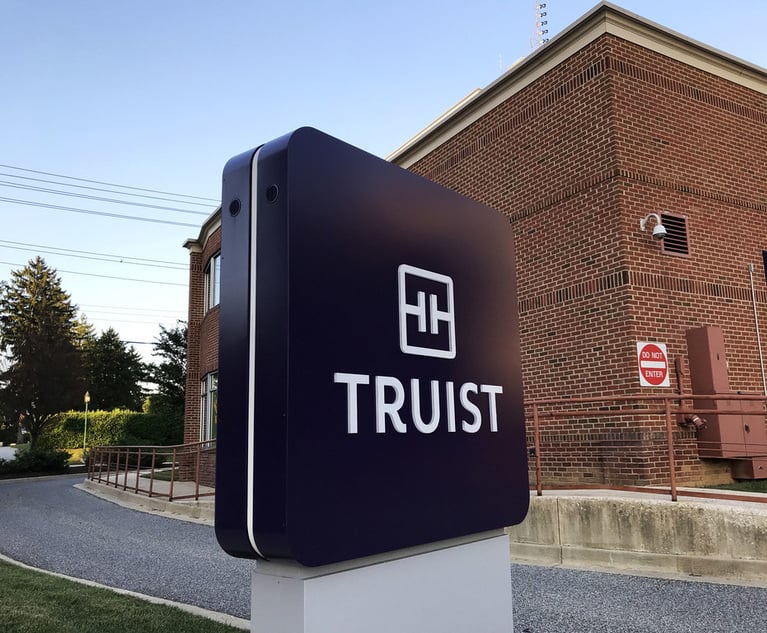Parking Authority Sanctioned for Causing Emotional Distress From Car Towing
One of the fundamental benefits of the filing of a bankruptcy case is the imposition of the “automatic stay” that bars creditor actions to continue collection of pre-petition debts without first obtaining relief from the stay from the bankruptcy court.
October 19, 2017 at 04:34 PM
7 minute read
 Left to right: Andrew Kassner and Joseph Argentina of Drinker Biddle & Reath.
Left to right: Andrew Kassner and Joseph Argentina of Drinker Biddle & Reath.
One of the fundamental benefits of the filing of a bankruptcy case is the imposition of the “automatic stay” that bars creditor actions to continue collection of pre-petition debts without first obtaining relief from the stay from the bankruptcy court. When a creditor willfully violates the automatic stay, the debtor can seek sanctions. These sanctions can include damages. In an Aug. 10 decision in a Chapter 13 case styled In re Odom, 570 B.R. 718 (E.D. Pa. 2017), Chief Judge Eric Frank of the U.S. Bankruptcy Court of the Eastern District of Pennsylvania awarded the debtor compensatory damages, including damages for emotional distress, against the Philadelphia Parking Authority (PPA), as a result of the PPA towing the debtor's car not once, but two times for not paying pre-petition parking tickets.
PPA Impounds Debtor's Car … Twice
According to the opinion, the debtor filed his Chapter 13 bankruptcy petition on Dec, 22, 2015. His schedules listed amounts owed to the Philadelphia Traffic Court for unpaid parking tickets. On June 10, 2016, the PPA, a local government agency whose duties include assisting the Philadelphia Traffic Court with collection of unpaid parking tickets, impounded the debtor's 2007 Audi Q7. Six days later, after receiving oral notice of the debtor's bankruptcy, the PPA released the debtor's car.
The debtor initiated an adversary proceeding against the PPA for willful violation of the automatic stay, seeking sanctions under Section 362(k) of the Bankruptcy Code. The parties filed cross motions for summary judgment. Simultaneous with the opinion issued in the main bankruptcy case discussed here, the court issued a memorandum opinion in the adversary proceeding denying the parties' motions for summary judgment, See Odom v. Philadelphia Parking Authority (In re Odom), 571 B.R. 687 (Bankr. E.D. Pa. 2017). That memorandum opinion mostly addressed the PPA's defense that it was immune from liability under the doctrine of sovereign immunity.
On June 1, 2017, while the court was considering the parties' cross motions for summary judgment in the adversary proceeding, the PPA again impounded the debtor's car, a development the court described as “quite striking.” The court found this second impoundment was the PPA's attempt to collect a prepetition debt, despite the fact that the PPA had notice of the debtor's bankruptcy. The opinion also describes that the PPA impounded the debtor's car while he was on vacation in Puerto Rico with his wife and terminally ill mother-in-law. After learning of the second car towing, the debtor arranged to return home. The debtor had originally planned for his sister to use his car to pick the travelers up from the airport. However, his car having been impounded, he had to make other arrangements for transportation upon their return on June 5, 2017. He recovered his car from the impound at approximately 9:30 p.m. that night.
The opinion states how these events caused the debtor emotional harm. The car seizure disrupted his vacation and return travel plans. The debtor also had difficulty sleeping after learning of the impoundment. The court also found the debtor was “frustrated, confused, upset and inconvenienced by the impoundment of the car.” The seizure also caused marital discord. The debtor testified that he and his wife had “ongoing issues as to whether the debtor adequately handled his responsibilities. The impoundment of the vehicle undercut the debtor's representation to his wife that he had taken care of his prior problems with the PPA.” The court also found the debtor had incurred $46 in telephone charges dealing with the situation.
The 'Lansaw' Effect
The court began its analysis by noting the debtor made only passing reference in its submission to section 362(k) of the Bankruptcy Code. Instead, the debtor sought a remedy for violation of the automatic stay based on civil contempt. The court found no material difference between the two remedies in this case. The court explained, “Civil contempt is a measure imposed to compel compliance with a court order and provide compensation to a party damaged by violation of that order.” To succeed, “a movant must establish by clear and convincing evidence, that the other party violated a specific and definite court order and that the party had knowledge of the order sufficient to put him on notice of the proscribed conduct.” The automatic stay in bankruptcy is the equivalent of a court order, and knowledge of the existence of the bankruptcy is effective knowledge of the automatic stay. A court has broad discretion in fashioning a remedy, which may include compensatory damages and attorney fees and costs.
The PPA raised two defenses. First, it asserted sovereign immunity from damages. The court denied that defense for the reasons set forth in the memorandum opinion issued in the adversary proceeding. Second, the PPA argued that it was merely an agent for the debtor's true creditor: the Philadelphia Traffic Court. The court rejected that argument by noting that numerous courts have held agents for creditors liable for conduct that violated the automatic stay, including attorneys of creditors who violate the discharge injunction. The court concluded the debtor established by clear and convincing evidence all of the elements to establish contempt of the automatic stay injunction.
The court then addressed damages. The debtor established out-of-pocket losses of $46 in telephone “overcharges.” The court denied the debtor's request for punitive damages, noting that remedy is precluded by section 106(a)(3) of the Bankruptcy Code. The court also denied the debtor's claims for lost work, finding the Debtor had failed to provide evidence connecting the car seizure to his loss of work.
Finally, the court considered the appropriateness of damages for emotional distress. The court noted the recent U.S. Court of Appeals for the Third Circuit decision in In re Lansaw, 853 F.3d 657 (3d Cir. 2017). In that case, the Third Circuit held that nonpecuniary emotional harm constitutes actual damages under Section 362(k) of the Bankruptcy Code, which deals with willful violations of the automatic stay. The Lanshaw court also eschewed “a rigid rule requiring the submission of medical documentation or expert medical testimony to support a damage claim for emotional distress.” The court applied the same principals to the case at hand, which sought damages for civil contempt for violation of the automatic stay.
In this case, the court found that the PPA's conduct had caused the debtor emotional distress. They impounded his car twice, the second time while he was vacationing in Puerto Rico with his terminally ill mother-in-law. It disrupted his vacation, return travel plans, and marital harmony. The court concluded the Debtor was entitled to $5,000 in “emotional distress damages.”
Conclusion: The Undeniable Becomes the Presumable
The Third Circuit's Lanshaw decision opened the door for debtors to assert damage claims for emotional distress in connection with willful stay violations, and without presenting medical evidence. Anyone who has had his car towed can say the experience is both emotional and distressful. Here, the court found that impounding a vehicle for unpaid parking tickets, a common occurrence in cities across America, may cause compensable emotional damages, at least when other extenuating circumstances are present. This case is an indication that courts may award damages on this basis when appropriate.
Andrew C. Kassner is the chairman and chief executive officer of Drinker Biddle & Reath, a national law firm with more than 635 lawyers in 12 offices. He chaired the corporate restructuring group for almost 20 years. He can be reached at [email protected] or 215-988-2554. Joseph N. Argentina Jr. is an associate in the firm's corporate restructuring practice group in the Philadelphia and Wilmington, Delaware, offices. He can be reached at [email protected] or 215-988-2541.
This content has been archived. It is available through our partners, LexisNexis® and Bloomberg Law.
To view this content, please continue to their sites.
Not a Lexis Subscriber?
Subscribe Now
Not a Bloomberg Law Subscriber?
Subscribe Now
NOT FOR REPRINT
© 2025 ALM Global, LLC, All Rights Reserved. Request academic re-use from www.copyright.com. All other uses, submit a request to [email protected]. For more information visit Asset & Logo Licensing.
You Might Like
View All
Federal Judge Allows Elderly Woman's Consumer Protection Suit to Proceed Against Citizens Bank
5 minute read
Dilworth Paxson Launches Erie Office With Longtime Local Banking Attorney
4 minute read
Stradley Ronon Bolsters Investment Management Practice With Vanguard Hire
4 minute readTrending Stories
- 1LSU General Counsel Quits Amid Fracas Over First Amendment Rights of Law Professor
- 2An Eye on ‘De-Risking’: Chewing on Hot Topics in Litigation Funding With Jeffery Lula of GLS Capital
- 3Arguing Class Actions: With Friends Like These...
- 4How Some Elite Law Firms Are Growing Equity Partner Ranks Faster Than Others
- 5Fried Frank Partner Leaves for Paul Hastings to Start Tech Transactions Practice
Who Got The Work
J. Brugh Lower of Gibbons has entered an appearance for industrial equipment supplier Devco Corporation in a pending trademark infringement lawsuit. The suit, accusing the defendant of selling knock-off Graco products, was filed Dec. 18 in New Jersey District Court by Rivkin Radler on behalf of Graco Inc. and Graco Minnesota. The case, assigned to U.S. District Judge Zahid N. Quraishi, is 3:24-cv-11294, Graco Inc. et al v. Devco Corporation.
Who Got The Work
Rebecca Maller-Stein and Kent A. Yalowitz of Arnold & Porter Kaye Scholer have entered their appearances for Hanaco Venture Capital and its executives, Lior Prosor and David Frankel, in a pending securities lawsuit. The action, filed on Dec. 24 in New York Southern District Court by Zell, Aron & Co. on behalf of Goldeneye Advisors, accuses the defendants of negligently and fraudulently managing the plaintiff's $1 million investment. The case, assigned to U.S. District Judge Vernon S. Broderick, is 1:24-cv-09918, Goldeneye Advisors, LLC v. Hanaco Venture Capital, Ltd. et al.
Who Got The Work
Attorneys from A&O Shearman has stepped in as defense counsel for Toronto-Dominion Bank and other defendants in a pending securities class action. The suit, filed Dec. 11 in New York Southern District Court by Bleichmar Fonti & Auld, accuses the defendants of concealing the bank's 'pervasive' deficiencies in regards to its compliance with the Bank Secrecy Act and the quality of its anti-money laundering controls. The case, assigned to U.S. District Judge Arun Subramanian, is 1:24-cv-09445, Gonzalez v. The Toronto-Dominion Bank et al.
Who Got The Work
Crown Castle International, a Pennsylvania company providing shared communications infrastructure, has turned to Luke D. Wolf of Gordon Rees Scully Mansukhani to fend off a pending breach-of-contract lawsuit. The court action, filed Nov. 25 in Michigan Eastern District Court by Hooper Hathaway PC on behalf of The Town Residences LLC, accuses Crown Castle of failing to transfer approximately $30,000 in utility payments from T-Mobile in breach of a roof-top lease and assignment agreement. The case, assigned to U.S. District Judge Susan K. Declercq, is 2:24-cv-13131, The Town Residences LLC v. T-Mobile US, Inc. et al.
Who Got The Work
Wilfred P. Coronato and Daniel M. Schwartz of McCarter & English have stepped in as defense counsel to Electrolux Home Products Inc. in a pending product liability lawsuit. The court action, filed Nov. 26 in New York Eastern District Court by Poulos Lopiccolo PC and Nagel Rice LLP on behalf of David Stern, alleges that the defendant's refrigerators’ drawers and shelving repeatedly break and fall apart within months after purchase. The case, assigned to U.S. District Judge Joan M. Azrack, is 2:24-cv-08204, Stern v. Electrolux Home Products, Inc.
Featured Firms
Law Offices of Gary Martin Hays & Associates, P.C.
(470) 294-1674
Law Offices of Mark E. Salomone
(857) 444-6468
Smith & Hassler
(713) 739-1250






